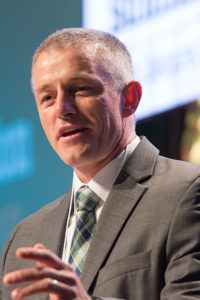
Perhaps nothing is more culturally fundamental than preparing meals together and enjoying the fruits of our labor. A shared agricultural experience – whether it be the meals we eat, landscapes we enjoy, or natural resources we steward – is as timeless as our soil, sunshine, land and water. This is when the world takes a moment to welcome each other to the table.
Agriculture is at the heart of the land-grant mission of Colorado State University. As we celebrate our 150th anniversary, the College of Agricultural Sciences sees our grand challenge – and opportunity – as nurturing future generations with a greater bounty and more seats at the table. The time is now: Agriculture is at the cusp of a new and exciting era when fundamental relationships are being reimagined. The catalysts of change are a series of drivers that fundamentally alter the way we think and act.
A projected population of more than 10 billion people by 2050 means that we will need to produce more food with fewer resources while reducing food waste. Agricultural scientists and researchers need diverse partners to solve problems, whether they be specialists in farming, ranching, engineering, business, consumer psychology, design or therapy. While our perspective is simultaneously local and international, all of us can lean in with our talent and learning to solve agricultural problems.

James Pritchett is executive associate dean of the Colorado State University College of Agricultural Sciences.
Cornerstone of trust
A new generation of consumers has evolving preferences for food and experiences. The evolution leads to a more demanding food industry: Is it safe, ethical, sustainable, healthy and nutritious? Agriculture’s ability to capture, trace and communicate is a cornerstone of trust in agricultural science.
That’s why our college has invested in foodsytems.colostate.edu and its activities for the betterment of our local, regional and global communities. We inform the social-cultural mission with programming in landscape design, urban agriculture and the unique bond that exists between the human and the horse. The Temple Grandin Equine Center is a one-of-its-kind center of excellence in equine-assisted therapy research and clinical efforts. Emerging innovation in processes and technologies is a pivot point in addressing grand challenges. We are focused on inspiration and world-class talent to achieve our goals.
The agribiome and agritech
The agribiome aptly describes the functions of microorganisms in the soil, plants, air, water, and the gut of humans and animals. We’ve hired the world’s best cohort of agribiome scientists to ask compelling questions, generate new knowledge and to teach the next generation of scientists.
Agritech describes our concerted effort to apply technologies to agricultural problems. Imagine the concept of the Internet of Things connecting an “internet of soil,” so that we apply the right amount of inputs in the right place using the right method at the right time. Data science leads to predicting and mitigating the outbreak of foodborne pathogens or thwarting invasive pests before they destroy crops or do other damage.
Colorado State University has long been a leader in developing agritech solutions and opportunities, bringing together experts for diverse areas to engage in critical conversations at the AgInnovation Summit. The fourth annual summit will be held at CSU on Dec. 5 and 6.
Come to the table
Our climate is shifting, and this is inspiring innovative approaches for resilient food and ecological systems for the betterment of people, animals, plants and society. A climate-smart agriculture allows for adaptation of food systems, and innovation means that agriculture can mitigate adverse impacts of a changing climate. Solutions start at ground level: CSU’s healthy soils initiative promotes resiliency and opportunity for greater benefits for all.
“Our climate is shifting, and this is inspiring innovative approaches for resilient food and ecological systems for the betterment of people, animals, plants and society.”
— James Pritchett, executive associate dean of the College of Agricultural Sciences
Nurturing future generations relies on cultivating all our diverse ideas and voices. Affirming a seat at the table for those new to agriculture alongside those who continue to steward the industry means we’ll find the unique idea and/or energy to meet our grand challenges.
The best platform for learning is based on experiences, which is why every agricultural sciences major at CSU involves a high degree of experiential learning in unique settings, whether it be the research farm, JBS Global Food Innovation Center on campus, the National Western Center currently under development in Denver, work in a research lab, internships, study abroad or extracurricular opportunities. There’s never been a better time in agriculture to work and learn alongside one another.
Now it’s time to get started. Let’s all come to the table, together, in agriculture’s new era.